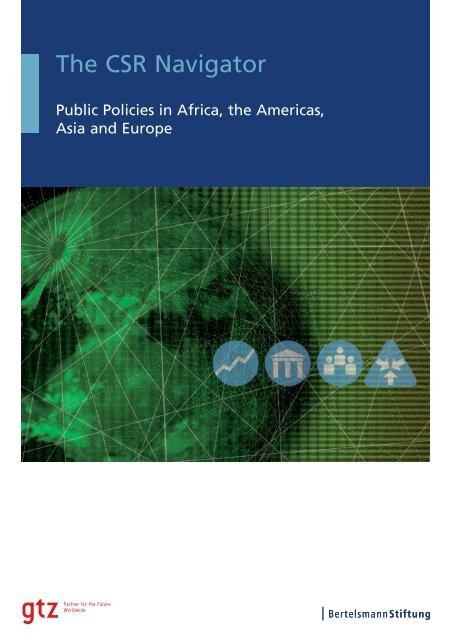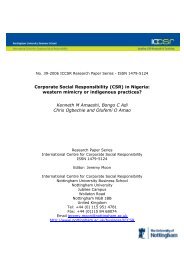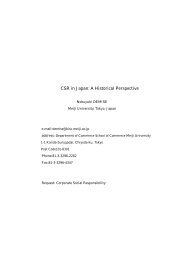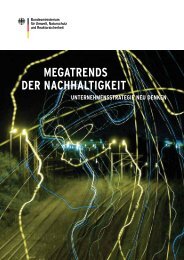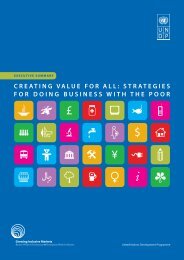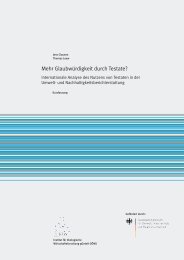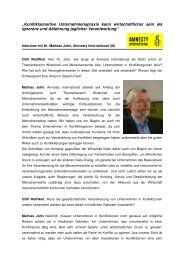The CSR Navigator - CSR WeltWeit
The CSR Navigator - CSR WeltWeit
The CSR Navigator - CSR WeltWeit
Create successful ePaper yourself
Turn your PDF publications into a flip-book with our unique Google optimized e-Paper software.
<strong>The</strong> <strong>CSR</strong> <strong>Navigator</strong>Public Policies in Africa, the Americas,Asia and Europe
Poland 1108Public Policy Rationales• Build upon traditional values tomediate between philanthropictraditions and the modern economy• Respond to external pressure byinternational actors (EU)Public Policy Activities• Mandating: Legislation concerningpublic-private partnerships, NGOsand corporate governance• Partnering: First steps towardsformalized cooperation betweensocietal actorsPublic Policy Actors• Ministry of Labor and Social Policy• Intergovernmental <strong>CSR</strong> workinggroup<strong>CSR</strong>-Relevant Context FactorsIncreasing level of economic integrationthrough EU membership,low level of trust in business actorsStable democracy, problems ofenforcement and corruptionStrong role of traditional actors,e.g. church and unionsLow level of cooperation betweengovernment and other actors■ Executive SummaryProfiling <strong>CSR</strong>Poland is a transforming economy and young democraticrepublic, which has been increasingly integrating intothe global political and economic system since 1989. Inspite of a national history marked by foreign dominance,Poland has preserved a strong national identity that hasbeen greatly influenced by the Roman Catholic churchand the country’s trade unions. Having joined NATO in1999 and the EU in 2004, Poland has been increasinglyintegrated into the Western system of states and cannow be counted as a close ally of the US. Internationaland supranational institutions like the World Bank, theUN or the Council of Europe are influential in Poland.Although the economy has been growing steadily reaching5% growth last year, unemployment is one of themain problems in Poland. <strong>The</strong> democratic political systemis widely accepted and is marked by the stable ruleof law, a multiparty system, a free press and acceptanceof international standards in all relevant policy areas.In spite of this successful transition, parts of society aredisappointed with the results of democratization andeconomic reform.<strong>CSR</strong> has just entered the political stage in the form ofan interministerial working group, as public authoritiesare beginning to conceptualize <strong>CSR</strong> as a strategic economicand societal concept that goes beyond a personal,moral or religious approach. Apart from internationalactors like the World Bank and the EU, the Ministry ofLabor deals with the issue on an informal basis. Up tonow, no explicit <strong>CSR</strong> policy has been formulated, butdue to the influence of EU membership and the politicsof reform, legislation in the fields of labor law, corporategovernance and NGOs can be regarded as preparatoryto a more outspoken <strong>CSR</strong> policy. <strong>The</strong> tendency to legislaterather than to promote or partner derives from thetraditionally strong role of the state in Poland and thelack of a cooperative civil society environment.Currently, the rationales behind <strong>CSR</strong> activities in Polandare a mixture of traditional philanthropic motives andthe strong impact of the EU and World Bank.1 Author of this country profile is Carolin Welzel, Bertelsmann Stiftung. She was advised by Boleslaw Rok, Business EthicsCentre LKAEM, Warsaw
Navigating <strong>CSR</strong>At the moment, some <strong>CSR</strong> activities are evident inPoland, but the subject is not yet being treated officiallyin terms of policy and responsibility within the government.Some instruments closely related to <strong>CSR</strong> are inplace, mostly connected to Corporate Governance, PublicPrivate Partnerships and welfare. <strong>The</strong> governmentpursues a number of mandatory measures, includingthose designed to support partnerships and cooperation.Communication on <strong>CSR</strong> by the public sector is weakas is the integration of stakeholders into the nascentdebate. If the work of the newly formed <strong>CSR</strong> workinggroup bears fruit, Poland might head towards a secondgeneration of <strong>CSR</strong> policymaking.needs to address the global economic level and promotedialogue and civil society organizations, while buildingupon its dominant, traditional set of values. By raisingawareness of <strong>CSR</strong> among businesses, the general imageof the business world could be improved. <strong>The</strong> integrationof stakeholders into the currently purely governmental<strong>CSR</strong> working group would also help to lay abroader basis for <strong>CSR</strong> in Poland. At the same time, itwould improve the relationship between the government,NGOs and the business sector.109<strong>The</strong> use of <strong>CSR</strong> as a means to promote social dialogueand to build trust is a challenge and an opportunity atthe same time. Skeptical attitudes among the Polishpeople towards the business community, an insecurework environment, political apathy and NGOs limited totraditional philanthropic welfare activities are amongthe issues that could be addressed by <strong>CSR</strong>. If publicauthorities find a way to raise the awareness of <strong>CSR</strong>’ssocietal potential among the Roman Catholic church andthe unions, the work of international bodies like theEU could be enhanced significantly. As a large andincreasingly industrialized EU member, Poland clearly1st<strong>CSR</strong> Public Policy Maturity LevelFirst to second generation:• Some application of <strong>CSR</strong>-related-2ndinstruments• No strategy or explicit instrumentsin place yet, but under development• No communication or evaluation• Very few attempts to raise stakeholderawareness<strong>CSR</strong> Recommendations• Political ownership and strategy on<strong>CSR</strong> should be clarified/developed• Promotion and implementationof international standards• Integration of traditional actors• Broad stakeholder integrationby government and partneringprojects on voluntary basis
110 ■ <strong>CSR</strong>-Relevant ContextPolitical, Social and EconomicSystem<strong>The</strong> national history of the Republic of Poland has beenone of ruptures. Centuries of Russian, Prussian, Germanand Austrian dominance were interrupted by only twoperiods of national self-determination, which lasted from1807 to 1913 and 1918 to 1939. After the Second WorldWar, Poland became part of the so-called Eastern Bloc.<strong>The</strong> country was one of the first states under Soviet influenceto begin the process of transition towards democracyand a market economy. Once it became a Soviet satellitestate in 1945 and a member of the Warsaw Pact in1955, societal unrest ensued, continuing throughout the1980s. <strong>The</strong> formation of the Solidarnosc (Solidarity)trade union movement in 1980 and its ban from officialpolitics in 1981 provided the foundation for an anti-communistmovement. US influence and, later on, EU supportwere also factors leading to roundtable negotiationsin 1989, which were followed by elections and the formationof the third Polish republic (Spiewak 2004: 7ff).Having joined NATO in 1999 and the EU in 2004, Polandhas been increasingly integrated into the Western systemof states and can now be counted as a close ally ofthe US. International and supranational institutions likethe World Bank, the UN or the Council of Europe areinfluential in Poland. <strong>The</strong> democratic political system iswidely accepted and is marked by a stable rule of law, amultiparty system, a free press and acceptance of internationalstandards in all relevant policy areas. In spiteof this successful transition, parts of society are disappointedwith the results of democratization and economicreform. This criticism is manifested by a falling electoralturnout, with only around 40 percent of the eligiblepopulation voting in the 2005 parliamentary elections.Although the EU has had great political and economicimpact, most Poles cannot be considered active Europeancitizens. At just over 20 percent, Poland had the lowestparticipation rate during the 2004 EU elections.Despite the ruptures in its national history, the Polishparliament – the Sejm, one of the two elected chambersthat form the national government – is one of theworld’s oldest parliaments and also existed in at leastsymbolic form during the Soviet era. <strong>The</strong> other chamber,the Senate, has consulting and veto power in terms oflegislation. Another long-lasting political element is thePolish constitution, which dates back the 14 th century.Poland is currently governed by a conservative majority.<strong>The</strong> twin brothers Lech and Jaroslaw Kaczynski ´ serve aspresident and prime minister, respectively, both beingmembers of the PIS (Law and Justice) party. <strong>The</strong> currentgovernment has been greeted with some skepticisminternationally because of the nationalist undertones ofmany of the speeches given and publications released byPIS members during and after the electoral campaigns.Next to the importance of a history characterized by foreigndominance, religion provides the moral underpinningfor Polish society and is a defining factor for socialand economic behavior. In surveys, usually only around10 percent of Poles say they are not religious; in ruralareas this figure is even lower. <strong>The</strong> importance of religiongrew after 1990, given the long prior ban underthe communist regime. Currently this aspect is beingchallenged by the transition process that is linkingPoland to the global economy. <strong>The</strong>re is criticism of theerosion of moral standards, and corruption is a problemto a certain degree. Polish society, however, is relativelyequal, with a Gini coefficient of 34.1 and a GenderEquity rank of 72.Since the market reforms began, the Polish economyhas been growing continuously and, after a short periodof stagnation, reached an annual growth rate of morethan 5 percent in 2006. Poland’s main trading partnersare western EU member states and, as a new member ofthe EU, the country receives financial support fromBrussels. Unemployment has been a severe problem inthe past but the number of jobless is slowly dropping.According to official statistics, currently 15 percent ofPolish workers are without jobs. Around 15 percent ofthe population still earns its living through farming, butagriculture as a share of GDP is declining continuously.A notable economic challenge will be stopping “braindrain” – especially among trained medical and scientificstaff – which has resulted from much higher wages inother parts of the EU.<strong>The</strong> rapid market reforms of the 1990s posed an economicas well as a political challenge for Polish society.As in all former Eastern Bloc states, before 1990 the
112 Development of <strong>CSR</strong> Public Policy<strong>The</strong> rather weak nongovernmental sector in Poland andthe sudden rush towards a market economy has createda situation where the call for government action in <strong>CSR</strong>relatedareas such as labor policy, fighting corruption orconsumer protection has become loud. <strong>The</strong> government,however, has been slow to react. Rather, the initiators ofthe Polish debate have been international organizations;the World Bank, for example, played an important roleby publishing a report on <strong>CSR</strong>-related opportunities inPoland and organizing the first stakeholder forum in2002. Memberships in organizations like the ILO and,above all, the EU have also given significant support tothe subject.<strong>The</strong> need to respond to pressure from Brussels and participationin the EU’s High Level Group on <strong>CSR</strong> led tothe formation of a <strong>CSR</strong> working group in 2007, situatedat a cross-cutting level between different ministries.This first step towards the development of a <strong>CSR</strong> policyhas been backed by a growing interest on the part of themedia, especially the business press, and academic circles.In addition, large MNCs active in Poland and a fewinternationally active Polish companies have venturedinto this terrain.<strong>CSR</strong> Policy Rationale<strong>CSR</strong> has become a subject in Poland as the country hasbecome increasingly embedded in the global politicaland economic system. As a member of the EU and anincreasingly industrialized country, Poland must meetthe expectations and requirements of its internationalpartners when it comes to production and consumption.Responding to this pressure from outside has led to initial<strong>CSR</strong> policy considerations and can be seen as achance for Poland to stay in touch with internationaldebates and current developments. Next to this externalrationale, a strong domestic one also exists. <strong>CSR</strong> inPoland is indirectly influenced by the strong moral roleof the church and the country’s philanthropic traditions,on the one side, and its extensive experience of a totalitariansystem and its subsequent transformation, leadingto a general distrust of private business, on theother. <strong>The</strong> role that <strong>CSR</strong> policy can play in this environmentis that of a mediator between cultural and societaltraditions and the challenges stemming from an increasinglyglobally integrated economy. On the societal level,the main task ahead for Poland’s leaders will be tomerge these two aspects and detach <strong>CSR</strong> from a purelyethical understanding, while harnessing the power ofthe country’s religious morality. In order to do so, theymust enhance the willingness among society’s actors tocooperate and work in cross-sectoral partnerships as away of creating synergies and building trust.■ <strong>CSR</strong> Situation<strong>CSR</strong> Public Policy: Understanding,Strategy<strong>The</strong> Country’s 2006 Development Strategy,NDP Consultative Process<strong>The</strong> Polish government has not yet formulated an explicitstrategy on <strong>CSR</strong>, as the subject is new on the policy agenda.Even though the Lisbon Agenda explicitly addresses<strong>CSR</strong>, Poland’s most recent implementation documentomitted the subject. Driven by external pressure, onlyrecently have political representatives begun addressingthe issue (World Bank 2006), since it is one that alsoaffects the political sphere. In this sense, no explicitgoals have been attached to the subject as yet and thereis no common understanding of what <strong>CSR</strong> actually is.Since the implementation of market reforms, the government’sview has been that any corporate action thatgoes beyond generating profit is a voluntary and purelyphilanthropic exercise. <strong>The</strong> driving force has generallybeen seen as the moral and mostly religious convictionsof private individuals. As such, state interference in thissphere has been deemed unnecessary. As Poland’s leadersbecome aware of <strong>CSR</strong>, it must evolve from a generalethical concern to a standard aspect of economic andpolitical development.Since its preparation for EU membership, Poland hasintroduced numerous standards in the fields of environmental,labor, trade and industrial policy, and many governmentsectors have evolved in order to meet EUnorms. In addition, topics such as sustainable development,social inclusion and the Lisbon Agenda have beenincluded in the country’s various legal policies in thepast three years.
<strong>CSR</strong> Public Policy: State Actors<strong>The</strong> most recent step towards establishing political responsibilityfor <strong>CSR</strong> has been taken by the Ministry of Labor,which has created a <strong>CSR</strong> working group at the interministeriallevel. <strong>The</strong> group consists of around 20 participantsfrom, among others, the Ministry of Labor, Ministry ofEconomics, Ministry of the Environment, Ministry of Finance,Office of Competition and Consumer Protection, and Officeof the Committee for European Integration. <strong>The</strong> idea behindthe working group is to develop a <strong>CSR</strong> policy for Polandand to present it to the EU by the end of the year.Several members of the working group have beenassigned responsibilities that cover certain aspects of<strong>CSR</strong>, such as Poland’s representation at the EU level onthe subject of <strong>CSR</strong>. <strong>The</strong> unofficial leading role of theMinistry of Labor is no surprise, since all labor issueshave currently been given priority in Poland. This is dueto the high unemployment rate and the difficulties inmeeting EU labor standards. Activities in this field canbe interpreted as a kind of pre-<strong>CSR</strong> policy. <strong>The</strong> Ministryof Labor and Social Policy has created a Department ofSocial Dialogue and Partnership 2 , which generallyaddresses labor law but also tries to go further. <strong>The</strong>department also deals with social dialogue, largely inthe form of a tri-partite commission, a rather newaspect for a formerly authoritarian state. Building civilsociety in Poland is not an easy task, as the departmentstates rather frankly on its website. A basis for societaltrust and a tradition of democratic rights are lacking,and negotiations between actors are more often markedby power politics than by a cooperative approach.Certain activities like the creation of PartnerstwoSpoleczne (Societal Partners) 3 have been launched by theministry to build the foundation for more cooperationbetween sectors and – perhaps paradoxically – torespond to Poland’s traditional state-centered attitudes.Along with the Law on Public Benefit described below, aCouncil on Public Benefit Activity was created to monitorthe law’s implementation. <strong>The</strong> council brings togetherselected representatives from NGOs, members of stateministries and representatives from local authorities.However, the corporate sector is not mentioned and thecouncil has been criticized as being counterproductivefor civil society, e.g. for its role as a consulting body tothe government as it drafted the new Social WelfareLaw (Golinski 2003; Kulik-Bielinska 2004).113Selected <strong>CSR</strong> State ActorsName Description Main Responsibilities/Activities<strong>CSR</strong> workinggroupInterministerial workinggroup founded in April 2007to discuss and develop governmentalstrategy on <strong>CSR</strong>To coordinate work of different departmentsin the Polish government in the area of <strong>CSR</strong>Ministry of Laborand Social PolicyTri-partite commissionCouncil of PublicBenefit ActivityLocation of Departmentof Social Dialogue andPartnershipRepresentatives fromadministration, businessorganizations and unions.Revitalized in 2001 by theAct on Tripartite Commissionfor Social and EconomicAffairs and on VoivodshipSocial Dialogue CommissionsMembers of NGOs and publicadministration to accompanythe Law on PublicBenefit ActivityCoordination of social dialogue in Poland: publicsector – business sector – trade unions on nationaland county level, <strong>CSR</strong> representatives (<strong>CSR</strong> HighLevel Group) at European Commissionhttp://www.mpips.gov.plConsultative body, analyzes and recommendsaction in the fields of labor and welfare law,the use of EU funds and entrepreneurshipdevelopment.http://www.mps.gov.pl/index.php?gid=729Monitoring and consulting especially with regardto mandatory cooperation between local administrationand NGOs2 http://www.mpips.gov.pl/index.php?gid=8913 http://www.dialogspoleczny.pl/
114 <strong>CSR</strong> Public Policy: Nonstate Actors<strong>The</strong> impetus for most <strong>CSR</strong> activities in Poland still comesfrom abroad. Just as the political sphere is influenced bythe EU and the World Bank, the main nonstate actors inthis field are either international organizations or multinationalcompanies and foundations of foreign origin.But as <strong>CSR</strong> becomes more and more known, somespecifically Polish institutions have been established.In terms of NGOs and foundations, the key internationalplayers are the German Friedrich-Ebert Stiftung 4 , theUS-based United Way 5 and, to some extent, the SorosFoundation 6 . <strong>The</strong> Friedrich-Ebert Stiftung supports a regionaldevelopment project aimed at promoting <strong>CSR</strong> in UpperSilesia. So far, it has focused on seminars and researchprojects; the segment on “good practices” has still to beaddressed. <strong>The</strong> United Way, a US-based umbrella organizationfor community activities, is dedicated to matchingcompanies with social projects, such as payroll deductionplans, corporate volunteering and other mediatingactivities. Other NGOs and foundations, such as theSoros Foundation, concentrate on specific aspects ofdeveloping civil society and <strong>CSR</strong>. For example, its Polishbranch, the Stefan Batory Foundation, deals with thesubject of corruption, a serious obstacle to developmentin Poland. In contrast to many other European countries,the OECD’s guidelines do not receive much attention;despite having been translated into Polish, there is noactive promotion or monitoring going on.<strong>The</strong> international influence regarding <strong>CSR</strong> has left itstraces. <strong>The</strong> first NGO to deal with <strong>CSR</strong> was the ResponsibleBusiness Forum, established in 2000. This organization,the partner of <strong>CSR</strong> Europe in Poland, publishes theannual Polish <strong>CSR</strong> Report, organizes best-practice fairsand carries out hands-on research projects. Although itwas founded by academics, NGO representatives andbusiness people alike, it remains dominated by MNCs.A new <strong>CSR</strong> organization is Centrum <strong>CSR</strong>, established asan independent applied research center targeting smalland midsized enterprises. Since its inception in 2006 ithas begun to play quite a significant role by organizingeducational training courses for smaller businesses.<strong>The</strong> Academy for the Development of Philanthropy is, asthe name states, not strictly bound to <strong>CSR</strong>, but promotesstrategic philanthropy and corporate citizenship. Its targetgroup is also SMEs.Although trade unions have played a prominent role inPoland’s history, especially through Solidarnosc, theyare not active in the field of <strong>CSR</strong> as yet. <strong>The</strong>y are stilllargely concerned with the problem of unemploymentand the violation of fundamental labor rights. Perhapsthe most active driver of <strong>CSR</strong> in Poland is the academicsector. Since it is closely linked to the international scientificcommunity, business ethics became a subject ofinterest at the end of the 1990s, a period that was stilldominated by market transition and economic insecurityin Poland. <strong>The</strong> Business Ethics Centre (CEBI) was inauguratedin 1999 and has since published reports, organizedconferences and held a monthly seminar on <strong>CSR</strong>.Currently it is a partner to the European Academy ofBusiness in Society (EABIS), which has sped up theprocess of linking Polish academics to the internationalscene. Another active academic player is the GdanskInstitute of Market Economics 7 , which is one of the driversbehind the Polish debate on corporate governance.This academic exchange remains somewhat theoretical,since its influence on business practice is rather marginal.Only MNCs active in Poland, such as Danone, BPor Toyota, are truly active <strong>CSR</strong> players, with various programsand projects in place. <strong>The</strong> first Polish <strong>CSR</strong> ranking,published in the May 2007 issue of the Polish edition ofManager Magazin, does highlight some very large Polishcompanies such as TP (Polish Telecommunication), PKNOrlen (oil refiner), the airline LOT or the breweryKompania Piwowarska, which have introduced <strong>CSR</strong> policiesthat go beyond mere public relations. However, itmust be noted that these companies are also highlyinfluenced by foreign managers, who sit on their boards,and by international capital flows. Polish companies thatconcentrate on the domestic market and the country’sSMEs may be active as philanthropists by donating moneyto community organizations, but they do not pursue <strong>CSR</strong>within a strategic management framework. Businessassociations, both international and national, promoteethical principles and organize seminars and awarenesscampaigns, but their activities in this field are not realizedfully by all their members, as the reluctant implementationof <strong>CSR</strong> by smaller Polish companies shows.Additional evidence for this can be seen in the limited<strong>CSR</strong> outreach activities carried out by large organizationslike Lewiatan (Polish Confederation of PrivateEmployers), which has 3,000 member companies.4 http://www.feswar.org.pl/5 http://www.unitedway.org.pl/6 http://www.batory.org.pl/english/about/index.htm7 http://www.ibngr.edu.pl/english/index2.htm and http://www.pfcg.org.pl/en/index.htm
Selected <strong>CSR</strong> Nonstate Actors115Major Business ActorsName Short description Main responsibilities/ActivitiesLewiatan(PolishConfederationof PrivateEmployers)Polish Chamber ofCommerce (PCC)Organization embracing3,000 companies employing600,000 people in totalLargest economic self-governmentalorganization inPoland, comprising over130 economic organizationsPromotion of ethical principles and “social manifesto”among member companies. Partner in severalprojects financed by the European Unionthat aim at promoting <strong>CSR</strong> issues. Organizesmeetings on business case of <strong>CSR</strong>.http://www.pkpplewiatan.pl/en/indexPolish partner of the 2005 EU project Awareness-Raising Campaign on <strong>CSR</strong> for SMEs. It carries outthe Employment Fair Play project. Promotion ofbusiness culture and labor market ethics, forwhich it organizes conferences, workshops forSMEs. http://www.kig.pl/AcademicBusinessEthics Center(BEC/CEBI)Founded in 1999 by theteam for business ethics atthe Institute of Philosophyand Sociology of the PolishAcademy of Sciences andLeon Kozminski Academyof Entrepreneurship andManagementResearch and study center as a meeting place forbusiness and academic leaders. BEC organizes anall-Poland monthly seminar devoted to ethics andcorporate responsibility and various conferences.It also publishes books, research reports andscientific papers. It is partner to the EuropeanAcademy of Business in Society and realizes internationalresearch projects, e.g. European Platformfor Excellence in <strong>CSR</strong> Research.http://www.cebi.pl/Civil SocietyResponsibleBusiness Forum<strong>The</strong> Academy forthe Developmentof Philanthropy inPolandFirst nongovernmentalorganization in Poland tofocus on the concept of<strong>CSR</strong>. <strong>The</strong> forum was establishedin Warsaw in 2000as an initiative of Polishbusinessmen, academicsand NGOs.Founded in 1998, it is activein: development of localcommunities, social businessinvolvement, socialentrepreneurship and individualphilanthropy.Cooperates with 19 strategic partners, but aboveall with multinational corporations operating inPoland. <strong>The</strong> forum organizes the annual GoodBusiness Practices Fairs, monitors the market bypublishing a yearly corporate responsibilityreport, carries out research projects and organizesmany meetings with business representatives.Since 2002, the forum has been the national partnerof <strong>CSR</strong> Europe.http://www.odpowiedzialnybiznes.pl/strona.php?kat=221<strong>The</strong> academy organizes a competition for thetitle of Benefactor of the Year. It promotes manyactivities in strategic philanthropy and sociallyresponsible business, especially among smallercompanies.http://www.filantropia.org.pl/english/e_menu.html
116Centrum<strong>CSR</strong>.PLAn independent organizationestablished in 2006and built by individualswanting to create a centerfor researching and communicatingthe conceptof corporate social responsibility.<strong>The</strong> goal is to bring together representatives ofcivil society as broadly conceived in debates onthe nature of <strong>CSR</strong> in Poland. Centrum<strong>CSR</strong>.PLalready takes part in educational projects forrepresentatives of small and midsized companiesin Poland as well as in projects launched by theacademic community.http://www.centrumcsr.pl/index.php?lang=en<strong>CSR</strong> HausProject for <strong>CSR</strong> in UpperSilesia, partnered byGermany’s Friedrich EbertStiftungInvolved mostly in awareness raising throughseminars and conferences; best-practice sectionis in development.http://www.csr-haus.pl/de/przylacz.php<strong>CSR</strong> Public Policy: Instruments andActivitiesa. Mandatory FrameworkPolish legislation has so far not made any explicit mandatoryrequirements for <strong>CSR</strong>. However, Poland’s accessionto the EU has brought about a number of laws connectedto labor and environmental issues that would becounted among <strong>CSR</strong>-relevant legislation elsewhere andwhich meet the minimum EU standard. For instance,the country’s support of employment of disabled personsis the result of standards accepted and practicedacross Europe. Introduction of many new EU standardsis a critical juncture in the process of change and thesometimes slow implementation that leaves many Polishbusiness people with a feeling of insecurity and uncertainty(Lewicka-Strzalecka 2006:442). This feeling ofinstability and excessive bureaucracy leads to Polishcompanies being discouraged in terms of social engagement.Obeying the law is already seen as a heavy burden,and going beyond it does not make sense for managerswho have not yet been introduced to the conceptof <strong>CSR</strong>.<strong>The</strong>re are a few areas where the government actuallybecomes active beyond basic EU legal recommendationsand requirements, the first being corporate governance.According to an assessment executed in 2005 by theWorld Bank, “Poland is at an advanced stage of corporategovernance debate, discussion and reform” (WorldBank 2005a). <strong>The</strong> public sector has been playing a moreinfluential role than in other emerging market countries,regulating mainly through the responsible governmentagency, the Polish Financial Supervision Authority 8 ,which is directly supervised by the government. Alldomestic companies are subject to the Code of CommercialPartnerships and Companies of 2001, which governsshareholder relationships, disclosure and audit questions.In recent years, introduction of legislation, a corporategovernance code and enforcement institutions have ledto compliance with all basic OECD principles in the fieldof corporate governance. Basic minority rights and disclosurerecommendations are in place and public companiesare required to file regular reports. It must besaid, however, that compliance with the standards isstill rather poor, and enforcement by the PSEC, especiallyon reporting, has its flaws. <strong>The</strong> regulation of pensionfunds is also still a weak spot. <strong>The</strong> topic is currentlybeing discussed by the Warsaw Stock Exchange, but sofar <strong>CSR</strong> is not being taken into account.A landslide event for the Polish NGO sector was thelaunch of the Law on Public Benefit Activities andVolunteerism in 2003, which gives civil society organizationsa clearly defined legal status and a number ofprivileges. <strong>The</strong> law also regulates the work of volunteers,offering them, among other things, accident insurance.This was esteemed as especially important, since thecountry’s long-standing tradition of charitable activityreemerged after 1989, and nowadays many areas thatare neglected by the state are taken care of by philanthropicand citizen organizations. Perhaps the mostimportant change initiated by this law is the mandatorycooperation between local governments and NGOs,which has led to an increase in joint projects and adecrease in skepticism. 9 In spite of these legal measures,critical voices remain, saying that especially communityfoundations, which are becoming more and more relevant,are facing legal challenges because of inconsistent8 http://www.knf.gov.pl/knf/index.jsp?place=Menu06&news_cat_id=763&layout=4&page=09 www.pozytek.og.pl./Public,Benefit,Organisations;554.html
interpretation of public financing law by local governments.<strong>The</strong>se problems may be seen as an inevitablepart of the societal and political transformation costs,but political observers have stated that the conservativeKaczyƒski government is trying to concentrate poweraround the national government (USAID 2006).<strong>The</strong> third area where the state has become active interms of regulation is the establishment of public-privatepartnerships. Poland is one of the few EU countrieswith a clear mandatory framework for cooperationbetween businesses and the public sector. Although afew PPPs – the international airport in Warsaw, forexample – have existed for a while, the general convictionwas that clear legal status for an instrument that isnew to young market economies would help to buildtrust and motivate more public agencies and companiesto work together. Since infrastructure development inPoland tops the government’s list, PPPs are one meansof reaching development goals. Critical voices say thatthe law has a tendency to burden the private partnerwith more risks than the public one. According torecent studies, some amendments and first viable exampleswill help the law to truly function from 2007onwards (PriceWaterhouseCoopers/Worldbank 2006). 10b. Soft Law<strong>The</strong> OECD guidelines are officially promoted by theNational Contact Point located within the PolishInformation and Investment Agency. This shows that theOECD guidelines are regarded as a tool for trade andmarketing purposes and not as an integrated aspect ofPolish business ethics. Apart from a short text about thepurpose of the guidelines and two links to the full textof the guidelines in English and Polish, only a contacttelephone number is given. No active promotion of theguidelines is taking place. <strong>The</strong> Global Compact wasintroduced in 2001 and member companies, mostlylarge multinationals, meet regularly and take part inUNDP projects. It cannot be counted among the mostactive bodies in Poland, and in many cases reportingdoes not take place.<strong>The</strong> third line of international impact on soft law comesfrom Brussels in form of the Lisbon Agenda. Poland hasadopted an implementation strategy for a NationalReform Program, not yet taking <strong>CSR</strong> into account, butmaking reference to the topic of sustainable development.As is the case with mandatory requirements, the mostactive field of <strong>CSR</strong>-related activities is corporate gover-117<strong>CSR</strong>-Relevant LegislationName Date Description and ReferenceCode of commercialPartnerships andCompanies2001 Part of the law on economic activity, legislates shareholderrelationships, disclosure and audit questions.www.uokik.gov.plLaw on Public Benefitand Volunteerism2003 Gives clear status to NGOs active in certain areas like socialwelfare and community development and makes cooperationbetween local authorities and NGOs on certain fieldsmandatoryhttp://www.pozytek.gov.pl/Public,Benefit,and,Volunteer,Work,Act,567.htmlhttp://www.usig.org/countryinfo/laws/Poland/Poland%20PBA.pdfPublic-PrivatePartnership law2005 Sets a clear framework for cooperation between business andadministration. After some changes, for instance regardinginsufficient guarantees on long-term budgeting by the publicsector to meet expected commitments to private partners,the law is expected to come into force from 2007 onwards.http://www.business.gov.pl/Public-Private,Partnership,(PPP),107.html10 http://www.business.gov.pl/Public-Private,Partnership,(PPP),107.html
118 nance. Apart from the government, the other majorplayer in this field is the largely state-owned WarsawStock Exchange (WSE) 11 , with its widely recognized BestPractices in Public Companies Code. Out of 317 companiesregistered at the WSE, 313 subscribe to the CGcode on the basis of “comply or explain,” which meansthat not all rules are followed. Generally, soft law doesnot seem to be the preferred way of introducing newpolicy ideas in Poland. <strong>The</strong> central role of the state government,the recent liberalization of the domestic marketand the rather pronounced division between societalactors does not seem to favor self-regulation, codes andother voluntary guidelines.c. Initiatives and PartnershipsDue to its era of communist rule, Poland cannot look backon a tradition of collaboration and partnering betweensocietal actors. Any problems that arise are usuallyregarded as a government affair. In light of this obstacleto societal development and peace, the Department ofSocial Dialogue and Partnership was created and tries toestablish cross-sectoral partnerships. Among the keytarget groups are trade unions and employers, withtheir often difficult relationship. Increasingly, though,professional lobby groups and NGOs are addressed,which demonstrates the gradual opening up of Polishsociety to civic dialogue. <strong>The</strong>re are three major formalpartnerships in Poland, and although none of themdirectly refers to <strong>CSR</strong>, they point in this direction.Launched in 1994 and renewed in 2001, the Socio-Economic Trilateral Commission was among the first bodiesof this kind and took part in the process of publicconsultations on the draft of the National DevelopmentPlan for 2007 – 2013 (Napiontek/Falkowski 2006).<strong>The</strong> formation of a Council on Public Benefit Activity wasalready integrated within the Law on Public Benefit of2003. It brings together 20 representatives of administration,NGOs and business and monitors the implementationof the law or assists in related disputes (KulikBielinska 2004). <strong>The</strong> Joint Central and Local GovernmentCommittee was created in the course of administrativereforms and links representatives from governmentwith self-governing municipal entities.d. Incentives<strong>The</strong> Public Benefit and Volunteer Act has introduced anopportunity to donate 1 percent of personal income taxto support organizations that benefit the public. For corporateorganizations, tax breaks of up to 15 percent arepossible on contributions for education, social welfare orsocial reintegration. <strong>The</strong> impact of the law is alreadyvisible: <strong>The</strong> sum of tax-exempt donations rose from €2.7to €11.4 million in just one year. 12e. Awareness<strong>CSR</strong> is still a very new concept to all actors in Poland.Consumers and business practitioners presently havepriorities that largely do not take into account ethicalbehavior or community involvement (World Bank2005b).Apparently it is not among the government’s prioritiesto change this: <strong>The</strong> bodies compiling and spreadinginformation and organizing meetings and conferencesare mostly the few business and NGOs active in thefield. <strong>The</strong>re is an annual award called Business FairPlay 13 that was initiated by the Polish Agency forEnterprise Development (PARP) and is now organized bythe Institute for Private Enterprise and Democracy of thePolish Chamber of Commerce. <strong>The</strong> prize focuses on highlightinggood working conditions and charitable actionsand is thus in line with the current Polish priorities oflabor issues and charitable activities.Poland currently has three eco-labels in place, whichhave not been very successful so far in terms of consumerawareness. As a World Bank report states, theselabels should be better adapted to the Polish market,and producers and consumers need to be betterinformed on what the labels are actually based on. SincePoland is a young market economy and transformingstate, rather sophisticated instruments like ethical consumerlabels still have a limited chance of becoming amatter of concern for the public (World Bank 2006).However, some recently founded NGOs such as eFTe arepushing the subject and have organized a workshop atgovernment level on the subject of fair trade.■ <strong>CSR</strong> Public Policy MaturityIn the EU, Poland is among the late starters in terms ofits development of public sector activities regarding<strong>CSR</strong>. Although some activities that can be counted as<strong>CSR</strong>-relevant are taking place, any awareness of <strong>CSR</strong>11 http://www.gpw.pl/12 http://www.forumdarczyncow.pl/13 http://www.fairplay.pl/
among government representatives is fairly new. <strong>The</strong>formation of the <strong>CSR</strong> working group and the appointmentof a <strong>CSR</strong> representative at the EU level are stepsin the right direction, but there is no officially responsiblebody and no strategy in place. Activities are mostlymandatory, and even if they are rather close or evenvery close to core <strong>CSR</strong> issues, they do not yet address<strong>CSR</strong> directly. In addition, the integration of stakeholdersand active communication on <strong>CSR</strong> are still lacking. Ininternational comparison, Poland is still in its first generationof <strong>CSR</strong> policy development, but the creation andfirst meetings of the <strong>CSR</strong> working group show that itcould enter into the second phase soon enough.119
120 ■ References• Cwiek-Karpowicz, Jaroslaw and Maciej Kaczyñski, Piotr (2006): Assisting negotiated transition to democracy.Available: http://www.isp.org.pl/files/20786472700373382001161863055.pdf• EU DG Employment (2006): What does business think about corporate social responsibility?Available: http://www.ec.europa.eu/employment_social/soc-dial/csr/060220_Hungary_Poland_Slovakia.pdf• Gasparski, Wojciech (2002): Towards the corporate social responsibility and business ethics in emerging economies of CentralEurope: <strong>The</strong> Polish case. Available: www.cebi.pl/publicacje/eabis.doc• Golinski, Igor (2003): Polish parliament adopts new law on public benefit activities and volunteerism.Available: http://www.efc.be/cgi-bin/articlepublisher.pl?filename=IG-SE-06-03-1.html• Kulik Bielinska, Ewa (2004): Poland’s Council on Public Benefit Activities: A new era of government-civil society partnership.Available: http://www.efc.be/cgi-bin/articlepublisher.pl?filename=EB-SE-01-04-1.html• Lewicka-Strzalecka, Anna (2006): “Opportunities and limitations of <strong>CSR</strong> in the post-communist countries: <strong>The</strong> case ofPoland.” In: (Lenssen, G., Gasparski, W., Rok, B.; Lacy, P. (eds.): Corporate Governance Vol. 6 No. 4, 440-448.• Napiontek, Olga and Falkowski, Mateusz: Civic dialogue in Poland – Consultations of the draft of the National DevelopmentPlan 2007 – 2013. Available:http://www.isp.org.pl/files/17602910030519646001185798884.pdf?PHPSESSID=32b7d8f1360f5dc1c2e55fa158b83352• PriceWaterhouse Coopers/<strong>The</strong> World Bank (2006): Hybrid PPPs: Levering EU funds and private capital.Available: http://www.pwc.com/pl/eng/ins-sol/publ/2006/ppp_world_bank.pdf• Rok, Boleslaw (2005): <strong>CSR</strong> in the context of restructuralisation in Poland. Available:www.msp.gov.pl/download.php?s=2&id=421 (in polish)• Schoenman, Roger (2005): “Captain or pirates? State-business relations in post-socialist Poland.” In: East European Politicsand Societies, pp. 40-75.• Âpiewak, Pawel (2004): Obietnice demokracji, Warsaw 2004, p. 7.• <strong>The</strong> World Bank (2005a): Report on the observance of standards and codes. Corporate governance assessment, Poland 2005.Available: www.pfcg.org.pl/files/176/41/168_rosc_cg_pol_05.pdf• <strong>The</strong> World Bank (2005b): Public expectations for corporate social responsibility in Poland.Available: http://ec.europa.eu/employment_social/soc-dial/csr/060220_poland.pdf• <strong>The</strong> World Bank (2006): <strong>CSR</strong> implementation guide. Non-legislative options for the Polish government.Available: http://siteresources.worldbank.org/EXTDEVCOMSUSDEVT/Resources/<strong>CSR</strong>ImplementationGuideNovember2006.pdf• USAID (2006): <strong>The</strong> NGO sustainability index, Poland.Available: http://www.usaid.gov/locations/europe_eurasia/dem_gov/ngoindex/2006/poland.pdf
121
<strong>The</strong> full study with detailed information on <strong>CSR</strong> public policies in the countries investigated is availablefor download (pdf) at www.bertelsmann-stiftung.de/csr or at www.gtz.de/csr


